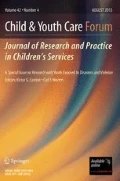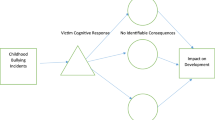Abstract
Minority adolescents who show poor adjustment to foster care often become linked to the criminal justice system. When referrals are made to counseling, the right modality can serve as a clinical buffer for personal growth and communicative dialogue. The use of a narrative approach that incorporates an optimal worldview can help the minority adolescent client struggling with repressed feelings and negative self-identity. An optimal worldview can offer the clinical practitioner an alternative framework that can help with assisting clients in working towards a more fulfilling life. Through the introduction and illustration of five clinical steps utilizing an optimal frame of reference, strategies are implemented through a case vignette. The five clinical steps, titled Holistic Integration Techniques (HIT), offer an approach for helping the minority adolescent to identify personal strengths and find self-worth based on internal characteristics.
Similar content being viewed by others
References
Alston, R.J. & Turner, W.L. (1994). A family strengths model of adjustment to disability for African American clients. Journal of Counseling & Development, 72(4), 378–383.
Benedict, M.I., Zuravin, S., Brandt, D. & Abbey, H. (1994). Types and frequency of child maltreatment by family foster care providers in an urban population. Child Abuse & Neglect, 18(7), 577–585.
Bynum, J.E. & Thompson, W.E. (1996). Juvenile delinquency: A sociological approach. (3rd ed.). Boston: Allyn & Bacon.
Canada, G. (1995). First stick knife gun. Boston, MA: Beacon Press.
Cape, W. (1973). Juvenile delinquency revisited. Police Chief, 64–67.
Herman, K.C. (1998). Composing and revising a counselor's narrative. Counseling & Values, 42(2), 101–105.
Hoskins, M.L. (1999). Worlds apart and lives together: Developing cultural attunement. Child and Youth Care Forum, 28(2).
Galloway, B., Nutter, R.W., Hudson, J., & Hill, M. (1995). Specialist foster family care for delinquent youth. Federal Probation, 59, 19–27.
Jones, J.M. (1992). Understanding the mental health consequences of race: Contributions of basic social psychological research. In D.N. Ruble, P.H. Constanzo, & M.E. Oliveri (Eds.), The social psychology of mental health: Basic mechanisms and applications. (pp. 199–240). New York: Guilford Press.
Kilpatrick, A.C. & Holland, T.P. (1999) An ecological systems-social constructionism approach to family practice. In A.C. Kilpatrick & T.P. Holland (Eds.), Working with families: An integrative model by level of need (2nd ed.). (pp. 16–36). Boston: Allyn & Bacon.
Kurtz, P.D., Tandy, C.C., & Shields, J.P. (1999). Narrative family interventions. In A.C. Kilpatrick & T.P. Holland (Eds.), Working with families: An integrative model by level of need. (2nd Ed.). (pp. 171–191). Boston: Allyn & Bacon.
Mather, J.H. & Lager, P.B. (2000). Child welfare: A unifying model of practice. Pacific Grove, CA: Brooks/Cole.
Moules, N.J. & Streitberger, S. (1997). Stories of suffering, stories of strength: Narrative influences in family nursing. Journal of Family Nursing, 3(4), 365–377.
Myers, L.J. (1991). Identity development and worldview: Toward an optimal conceptualization. Journal of Counseling and Development, 70, 54–63.
Myers, L.J. & Speight, S. (1994). Optimal theory and the psychology of human diversity. In E. Thickett, R. Watts and D. Berman (Eds.), Perspectives on people in context (pp. 104–114). New York: Jossey/Bass.
Neighbors, H.W., Jackson, J.S., Broman, C.L., & Thompson, E. (1996). Racism and the mental health of African Americans: The role of self and system blame. Ethnicity and Disease, 6(2), 167–175.
O'Donnell, J.F. (1999). Involvement of African American fathers in kinship foster care services. Social Work, 44(5), 428–441.
Parham, T. (1996). MCT theory and African American populations. In D.W. Sue, A. Ivey, and P. Pederson, A theory of multicultural counseling and therapy. Pacific Grove, CA: Brooks/Cole.
Roberts, G.W. (1994). Brother to brother: African American modes of relating among men. Journal of Black Studies, 24, 379–390.
White, M., & Epston, D. (1990). Narrative means to therapeutic ends. New York: W.W. Norton.
Worden, M. (1999). Family therapy basics. (2nd Ed.). Pacific Grove, CA: Brooks/Cole.
Author information
Authors and Affiliations
Rights and permissions
About this article
Cite this article
Kirven, J. Building on Strengths of Minority Adolescents in Foster Care: A Narrative-Holistic Approach. Child & Youth Care Forum 29, 247–263 (2000). https://doi.org/10.1023/A:1009496730434
Issue Date:
DOI: https://doi.org/10.1023/A:1009496730434




